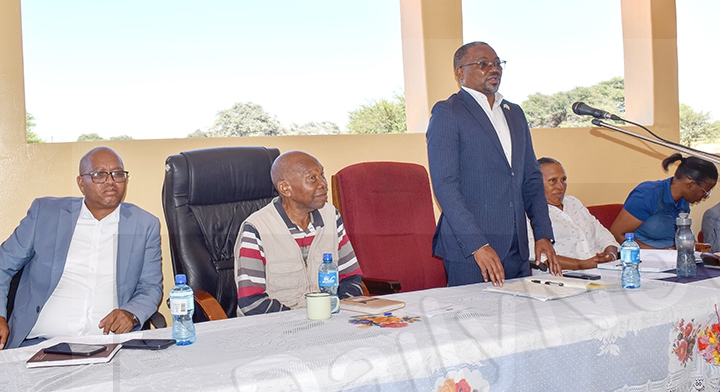Malwelwes digital dawn sparks new hope for students
26 Aug 2024
In the quiet village of Malwelwe, nestled about 25km from Letlhakeng in Kweneng West, a digital revolution is silently taking root.
In 2023, the local primary school embraced government’s initiative to integrate Information Communication Technology (ICT) into its curriculum.
The move has brightened the lives of students in one of Botswana’s rural areas.
For these young learners, many of whom come from underprivileged backgrounds where electronic devices and internet access are rare luxuries, the arrival of ICT has been nothing short of transformative.
The thrill of holding a tablet, excitement of navigating through various educational applications and the exposure to the boundless world of the internet have sparked a renewed enthusiasm for learning in the hearts of these children.
Malwelwe Primary School’s acting school head, Ms Morwadi Tsalaeile, sees the programme as a beacon of hope for a community where many families struggle to make ends meet.
“The integration of ICT has empowered both teachers and learners, allowing them to engage with the digital economy in ways we never thought possible,” says Ms Tsalaeile in an interview.
“The Internet on its own brings learning to a whole new level. We are now able to prepare lessons more effectively and provide typed notes for students who struggle to keep up with traditional note taking,” she enthuses.
While the school has faced its share of challenges, resulting in academic performance that has not always met expectations, Ms Tsalaeile remains optimistic.
She has already begun to notice signs of improvement, a demonstration of the potential ICT has in elevating education in even the most disadvantaged areas.
The school’s ICT officer, Ms Neo Mafa, echoes the sentiments to highlight the profound impact that technology has had on the students’ learning experiences.
“The use of tablets and internet has greatly enhanced learning and fostered a dynamic learning environment,” she reckons. Thus, the integration of ICT has not only made lessons more engaging, but has also provided the pupils with the necessary skills to thrive in an increasingly digital world.
In a village where life’s hardships are a daily reality, the introduction of ICT into Malwelwe Primary School has become a source of pride and a symbol of progress.
The excitement of the pupils as they look forward to their ICT lessons is a powerful reminder of the potential for technology to bridge gaps, create opportunities and inspire hope in even the most remote corners of Botswana.
Ms Mafa explains that her initial task in inducting learners and fellow teachers was to capacitate them on computer hardware components using pictures to illustrate their functions and how they work.
“I started off by showing them every component and did some practical exercises with them on computer aided teaching,” she adds.
The amazing part, she reckons was their excitement to discover the proficiency through which to switch a computer on and off as well as other applications including using a computerised calculator, typing in MS word, painting pictures besides using some Apps that helped them to learn English online.
For outsiders, such as the BOPA team that visited the pupils during their IT lessons, the enthusiasm was profound.
The learners’ faces lit up with excitement as they interacted with the tablets, revelling in the touchscreen functionality and the ease of navigating various Apps. The sheer joy on their faces was evident each time it was time to head to the ICT lab.
Government’s initiative to bridge the digital divide and foster a knowledge-based economy by integrating digital literacy into the curriculum has proven to be a significant blessing for both teachers and pupils in Malwelwe.
The move has not only enhanced the learning experience, but has also paved the way for a brighter future for the village’s young minds.
To this end, Ms Mafa notes that the programme has also been extended to the working community of Malwelwe as well.
“My roles include imparting ICT skills to teachers, students and all government departments including village extension personnel, Village Development Committees and dikgosi,” she says. The arrival of Internet connectivity at Malwelwe Primary School has also sparked excitement for the local community.
Residents are thrilled by the rare opportunity to access free Internet, a newfound resource that has become a significant boon in their remote village.
The availability of this digital lifeline has brought a wave of excitement and optimism to Malwelwe, underscoring the transformative effect of internet access on both education and community life.
“The villagers have embraced a new way of life as the school is now experiencing walk-ins from members of the community who come to the precincts of the school to get connected,” notes another teacher, Ms Tumelo Letsotle.
She also concurs that introducing ICT in schools has brought incredible learning experiences to both teachers and learners in the most remote areas of Botswana. “ICT has really transformed learning, improved the capacity to educate and dramatically enriched the quality and effectiveness of teaching, literally, overnight,” she says.
Government’s digitalisation programme for schools, launched in three phases, began in 2020 and continued post COVID-19.
Initially rolled out to secondary schools in late 2021, the programme has since extended to primary schools as part of a broader effort to revolutionise the education sector.
The initiative represents a significant step toward realising Botswana’s vision of a Knowledge-Based Economy.
By integrating digital tools and resources into the curriculum, government aims to enhance educational outcomes and ensure that all Batswana have access to quality education. ENDS
Source : BOPA
Author : Mmoniemang Motsamai
Location : MALWELWE
Event : INTERVIEW
Date : 26 Aug 2024






